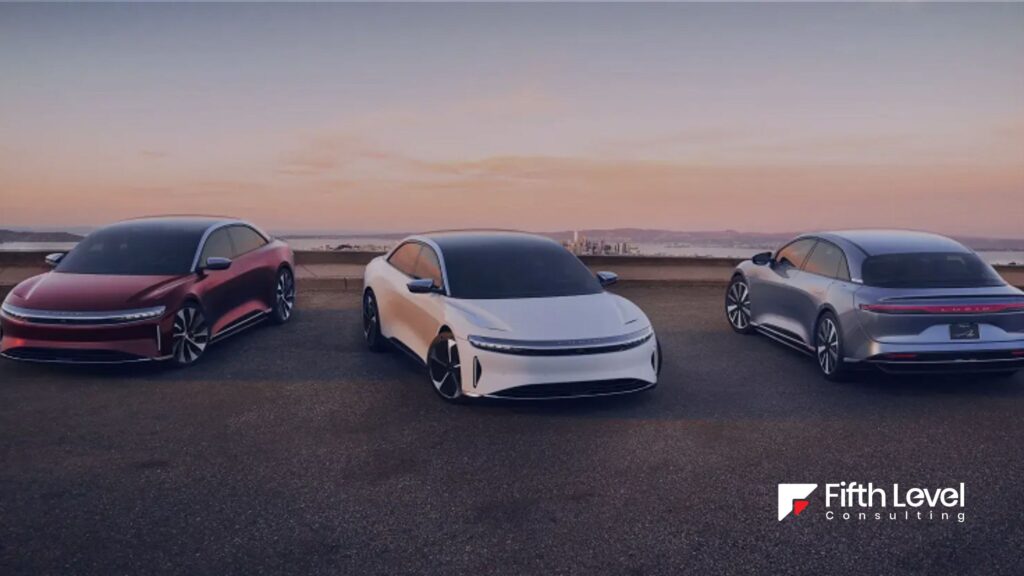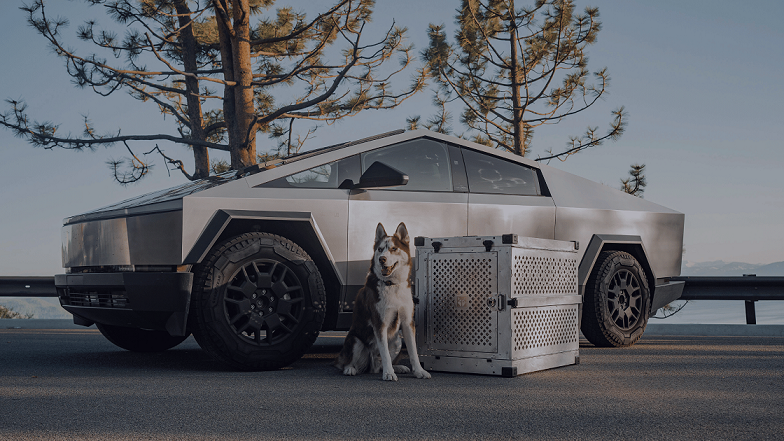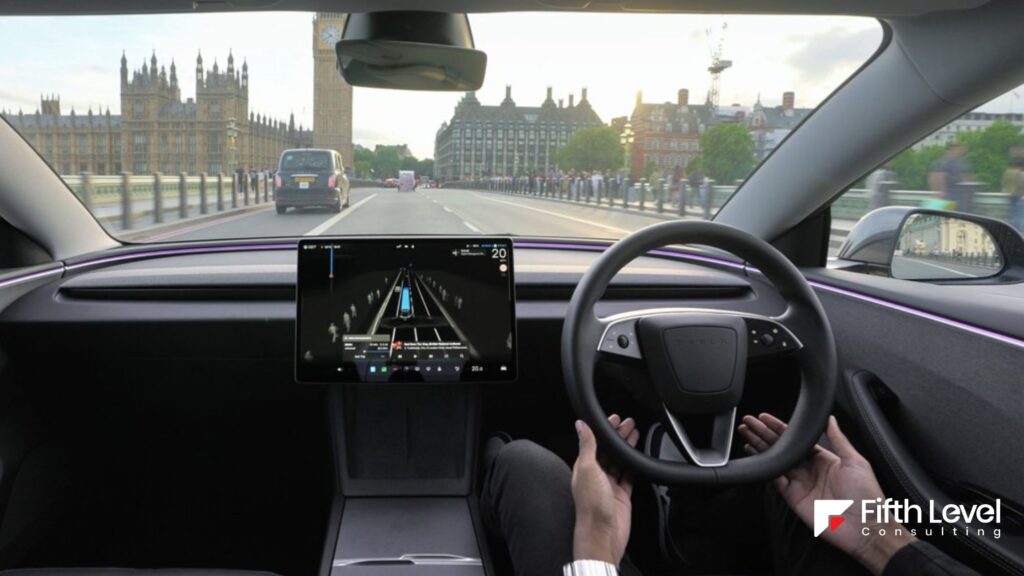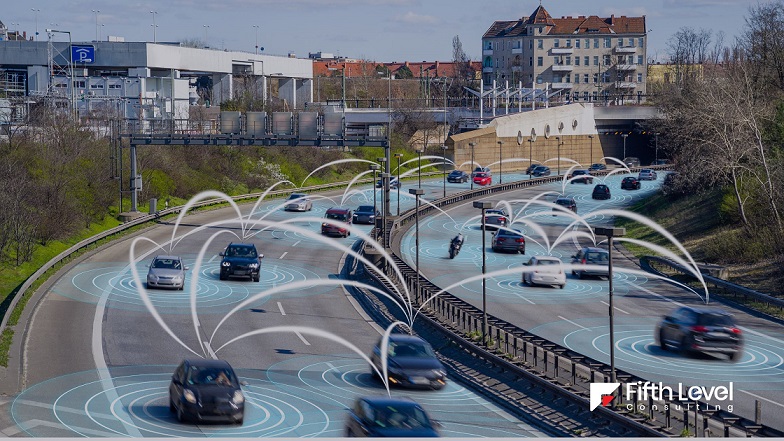Table of Contents
- 50% of all the orders we have are from former Tesla owners – Peter Rawlinson, Lucid Motors CEO and CTO.
- MotorTrend called the Lucid Sapphire the “best-performing EV they’ve ever tested,” especially noting better brake feel and chassis balance.
- “We’re not trying to beat Tesla at their game. We’re playing a different game,” Rawlinson noted in an interview with Forbes.
Just a few years back, electric vehicles (EVs) were seen as a niche trend. Today, they’ve captured the spotlight—drawing serious interest from consumers, policymakers, and automakers around the world. According to the International Energy Agency, global EV sales soared past 14 million units in 2024, a clear sign of their mainstream acceptance.
For over a decade, Tesla has reigned supreme, its sleek designs and cutting-edge technology setting the benchmark for what an EV could be. However, a new contender, Lucid Motors, has emerged from the California desert, challenging the status quo with flair. With its luxurious array of EV models, Lucid is not just competing—it’s redefining luxury and performance in electric vehicles.
“The Lucid Air’s interior would honestly give the Germans’ finest a run for their money.” A review from Grassroots Motorsports, highlighting its departure from conventional design norms.
The Rise of Lucid Motors
Founded in 2007 under the original name Atieva, Lucid Motors spent nearly a decade perfecting its technology before unveiling its first production car, the Lucid Air. Led by Peter Rawlinson—former Chief Engineer of the Tesla Model S—the company utilized its foundational expertise in EV battery systems to design a holistic driving experience.
“We’re not trying to beat Tesla at their game. We’re playing a different game,” said Rawlinson, detailing Lucid Motors’ luxury electric vehicles with Forbes.
Lucid Motors is a fully American electric vehicle manufacturer. It is particularly known for producing luxury, high-performance electric cars featuring long range, cutting-edge technology, and premium craftsmanship. Lucid Motors also sells EV powertrains and battery systems, as well as designing and developing in-house proprietary software for its vehicles. Headquartered in Newark, California, Lucid is one of Tesla’s most prominent rivals in the high-end EV space and has quickly positioned itself as a technology-first, luxury EV brand with global ambitions.
Lucid EV Models
- Lucid Air Pure
- Lucid Air Touring
- Lucid Air Grand Touring
- Lucid Air Sapphire
- Lucid Gravity
Lucid Motors Key Differentiators from Tesla and Other EV Makers
| Area | Lucid Advantage |
| Range | Longest EPA-rated range of any EV (up to 520 miles) |
| Charging | 900V architecture allows faster and cooler charging |
| Luxury | Interior design and ride quality rival Rolls-Royce and Mercedes-Benz |
| Tech | In-house development of motors, inverters, software, and ADAS |
| Efficiency | Market-leading miles per kWh, redefining EV efficiency |
| Design | Focus on aerodynamics, elegance, and comfort in every model |
Hand-Crafted Luxury Interior Designs
Lucid has made it clear from the start that they’re not trying to copy what Tesla is doing. Their goal is to elevate electric vehicles into something more refined, more human. And it all starts with the interior. Stepping inside a Lucid Air unravels a quiet sense of elegance. The seats are wrapped in soft, responsibly sourced leather or Alcantara. The stitching is hand-done. Some of its carpets are made from recycled yarns, which gives the cabin a sustainable touch without sacrificing comfort.
There’s also an emphasis on space. Because Lucid built its own compact motor and battery technology, the company was able to stretch out the cabin. You get more legroom, more headroom, and a flat floor in the back. This design freedom makes every inch count, giving passengers room to stretch out and relax.

Lucid’s head designer once said their goal was to make the cabin feel like a private jet. And honestly, they’re right on track.
Conversely, Tesla goes for a stark, minimalist interior—some say it’s sleek, others think it’s cold. For some, this simplicity is modern and refreshing. For others, it feels bare, Spartan. The materials Tesla uses are functional, but they don’t evoke the same tactile warmth you get in a Lucid. Plastic trims, synthetic upholstery, and flat surfaces make the cabin feel more like a gadget than a getaway.
Interior Comparison
| Feature | Lucid Motors | Tesla |
|---|---|---|
| Design Focus | Luxury, Comfort, Refinement | Technology, Minimalism |
| Materials | Premium Leather, Alcantara, Recycled Yarns | Vegan Leather, Modern Materials |
| Craftsmanship | Hand-done stitching, Meticulous details | Machine Precision, Streamlined |
| Overall Feel | Private Jet-like, Elegant | Modern, Tech-Forward |
Lucid’s design superiority isn’t just about the Air sedan; the 2025 Gravity SUV takes it to new heights. Designed for families who refuse to compromise on elegance, the Gravity (Grand Touring version) offers a seven-seat configuration with second-row captain’s chairs that rival private jet seating. Its cargo space, at 112 cubic feet, is cavernous yet doesn’t compromise the cabin’s premium feel. The Gravity’s interior mirrors the Air’s, with hand-crafted leather, wood, and metal accents, but adds essential touches like heated and cooled cupholders and a retractable center console.

Tesla’s Model X, while spacious, relies on a similar minimalist formula as the Model S, with fewer premium material options. In Q1 2025, the Gravity outsold the Model X by 15%, per Cox Automotive, reflecting consumer preference for Lucid’s richer design. The Gravity’s panoramic roof, with electrochromic glass that adjusts opacity, further elevates its jet-inspired aesthetic, offering passengers a customizable view of the sky.
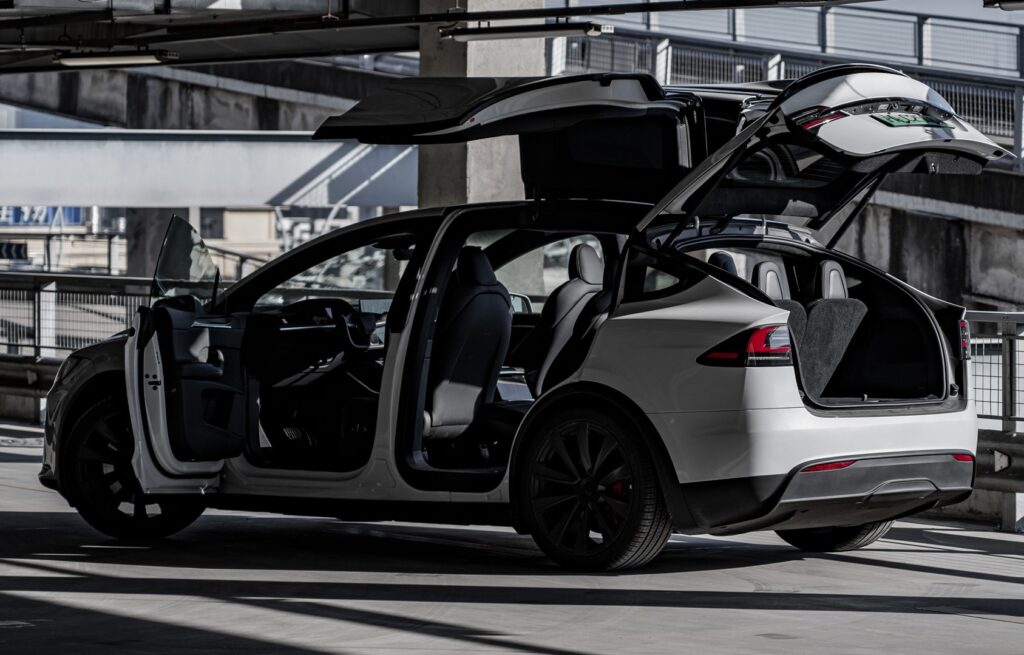
Lucid’s clever packaging, including a compact powertrain, maximizes interior space without compromising range or performance. The Air Grand Touring, with its 512-mile EPA-estimated range, proves that luxury and efficiency can coexist. Tesla’s Model S Long Range, at 410 miles, falls short in this regard. A 2024 Car and Driver test praised Lucid’s “thoughtful ergonomics,” noting how every element feels purposefully designed. This balance of form and function sets Lucid apart in a market where buyers demand both.
In 2025, 68% of luxury EV buyers cited “unique design” as a purchase driver, per a McKinsey study. Lucid’s ability to offer bespoke options, like the Santa Monica theme with its coastal-inspired blues and grays, taps into this desire for personalization.

Longest EPA-rated Range of Any EV
Lucid Motors has set a new benchmark with its Lucid Air sedan, boasting the longest EPA-rated range of any EV at 512 miles for the Grand Touring trim. This achievement not only outpaces competitors like Tesla but also redefines what’s possible in electric mobility.
“The Lucid Air Grand Touring is our longest-range car—in fact, the longest-range EV available today,” says Peter Rawlinson, CEO and CTO of Lucid, highlighting the brand’s technological prowess.
Lucid’s range supremacy began with the Air Dream Edition Range, which in 2021 secured an EPA-rated 520 miles, a record that surpassed the Tesla Model S Long Range Plus by over 100 miles. The 2025 Lucid Air Grand Touring, with its 512-mile EPA rating, retains this leadership despite stricter EPA testing protocols introduced in 2024.
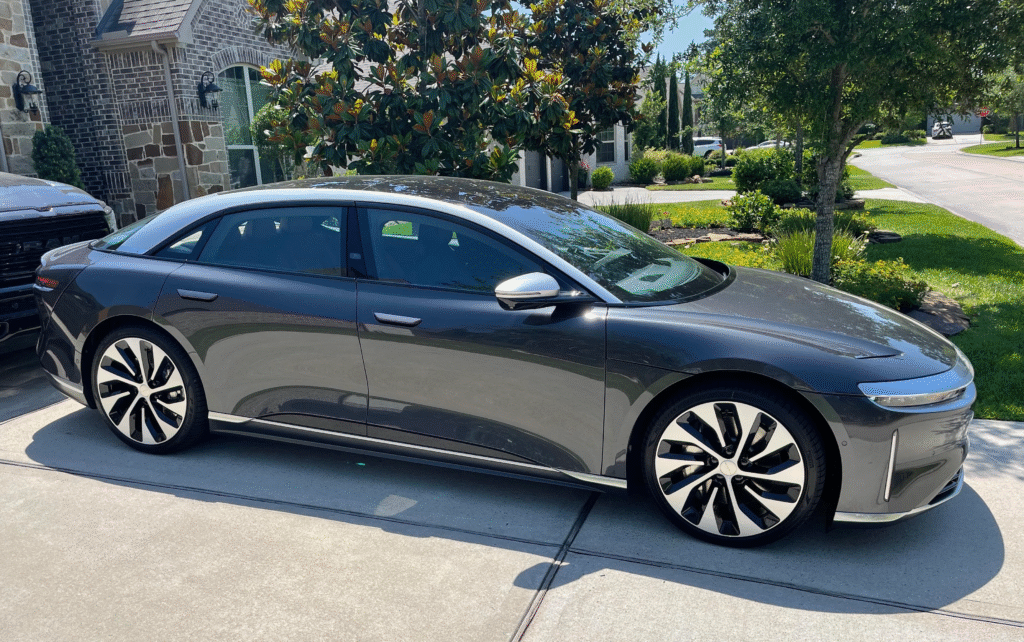
This consistency is remarkable, as the updated standards account for colder temperatures and higher speeds, which typically reduce range estimates. The Air’s ability to maintain over 500 miles under these conditions underscores its engineering edge. A 2024 Car and Driver test validated this, with the Grand Touring achieving 515 miles at a constant 70 mph, outperforming its EPA estimate.
Lucid’s efficiency is simply a technological marvel, and Rawlinson attributes this feat to a proprietary 900-volt architecture and compact, lightweight electric motors. In contrast, the Tesla Model S Long Range offers 410 miles, while the Model S Plaid manages 396 miles, per EPA data, highlighting Lucid’s significant lead.
The secret to Lucid’s range lies in its obsessive focus on efficiency. The 2025 Air Pure, priced at $69,900, achieves a landmark 5.0 miles per kilowatt-hour (kWh), earning a record 146 MPGe EPA rating, the highest for any production vehicle. This efficiency stems from a modular battery design, optimized power electronics, and a drag coefficient of 0.197, making the Air more aerodynamic than a Tesla Model S (0.208) or a Mercedes-Benz EQS (0.200). The Air Pure’s 84-kWh battery delivers 420 miles of range, outstripping the Tesla Model 3 Long Range’s 363 miles with a larger 82-kWh pack.
“We’ve achieved this landmark by Lucid’s world-leading, in-house EV technology, not by simply installing an oversized battery pack,” Rawlinson emphasized in a 2021 Driving.co.uk interview.
This approach contrasts with competitors who rely on larger, heavier batteries, which increase costs and environmental impact.
A 2024 Bloomberg Green EV rating gave the Air Grand Touring a score of 71/100, the highest among EVs, for its balance of range, weight, and battery size.
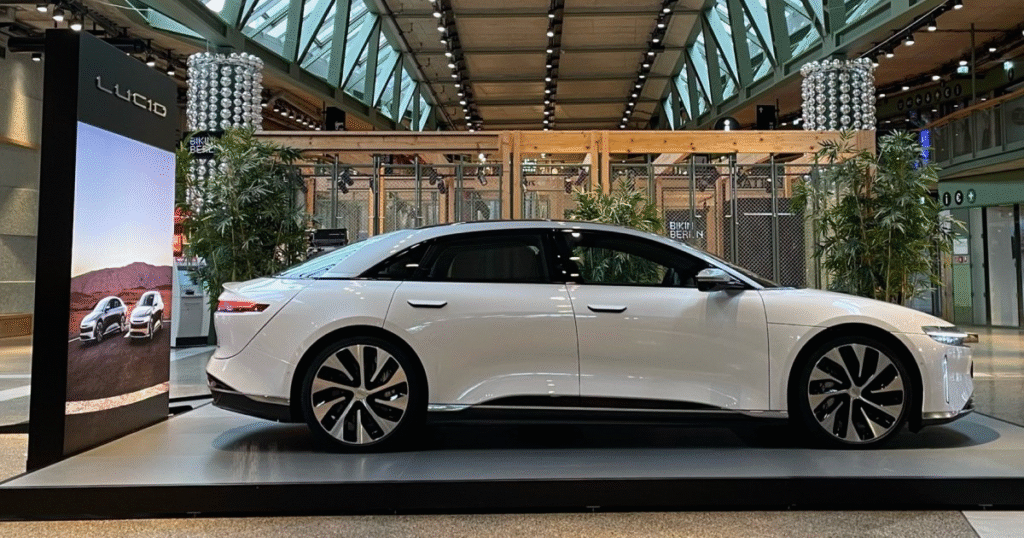
Real-world testing further validates Lucid’s claims. In a 2022 Edmunds test, the Air Dream Range covered 505 miles, falling just short of its 520-mile EPA estimate but setting a new benchmark by surpassing the previous record-holder, the Mercedes-Benz EQS 450+, by 83 miles. Similarly, a 2024 InsideEVs test saw the Air Grand Touring travel 523.7 miles at 70 mph, with energy consumption of 4.4 miles/kWh, better than the EPA’s 3.8 miles/kWh estimate. These results are significant because highway driving typically reduces EV range compared to mixed city-highway EPA tests. Lucid’s ability to exceed expectations in such conditions alleviates range anxiety, a concern cited by 65% of prospective EV buyers in a 2024 Cox Automotive study.
The Lucid Gravity SUV, launched in 2025, extends this range legacy with an EPA-rated 450 miles for the Grand Touring trim, outpacing the Rivian R1S (410 miles) and BMW iX (387 miles). Powered by Panasonic’s latest high-performance batteries, the Gravity can gain 200 miles in 11 minutes at 400-kW chargers, making it a practical choice for families.
“The Gravity’s 450-mile range is a force of attraction like nothing else,” Lucid posted on X in April 2025, highlighting its market appeal.
This aligns with a 2025 trend of SUVs dominating EV sales, with 52% of U.S. EV purchases being crossovers or SUVs, per BloombergNEF. The Gravity’s range, combined with 828 horsepower and a 0-60 mph time of 3.5 seconds, positions it as a versatile rival to Tesla’s Model X, which offers 348 miles.
In 2025, users are praising Lucid’s “game-changing” range for long-distance travel, reflecting growing consumer confidence in the automaker’s capabilities.
Lucid’s Charging Infrastructure Strategy
Lucid’s range advantage is amplified by its charging infrastructure strategy. In 2025, Lucid adopted the North American Charging Standard (NACS) connector, granting access to Tesla’s 23,500+ Supercharger stalls globally.
Starting July 31, all Lucid Air models will have access to 23,500+ Tesla Superchargers, with a Lucid-approved adapter, Lucid Motors announced on X.
Combined with partnerships with Electrify America, which offers 900 high-speed chargers in the U.S., the Air Grand Touring can add 240 miles in 30 minutes at 350-kW stations. The Air’s 924-volt architecture supports up to 300 kW fast charging, enabling 300 miles of range in just 20 minutes under ideal conditions.
“Lucid’s proprietary boost technology raises incoming 500-volt power to match the pack’s 926 volts,” notes a 2025 Wired review, explaining its compatibility with Tesla’s V3 Superchargers.
This addresses a key barrier to EV adoption, as 58% of U.S. buyers in a 2024 J.D. Power survey cited charging availability as a top concern.
Advanced Safety and Driver Assistance Technologies
Advanced driver-assistance systems (ADAS) in electric vehicles are no longer a luxury but a necessity, with 68% of buyers prioritizing safety features, according to a J.D. Power survey. Lucid Motors is setting a new standard with its DreamDrive Pro, an ADAS suite that blends cutting-edge hardware, intuitive software, and future-ready design. Unlike competitors like Tesla, which relies on a camera-centric approach, Lucid’s DreamDrive Pro leverages a comprehensive 32-sensor array, including high-resolution LiDAR, to deliver unmatched safety and convenience.
“We have developed Lucid DreamDrive to be among the most advanced ADAS to ever be offered to consumers,” says Dr. Eugene Lee, Senior Director of ADAS and Autonomous Driving at Lucid Motors.
Lucid got even more serious with ADAS and robotaxi development when they entered a groundbreaking partnership deal with Nuro and Uber. The deal promises to roll out over 20,000 autonomous Lucid Gravity SUVs as robotaxis on Uber’s platform, starting in a major undisclosed U.S. city in 2026. Nuro’s battle-tested autonomous driving capabilities will be integrated into the Lucid Gravity’s SUVs.
Lucid Motors’ Saudi Arabia Connection
Lucid Motors has forged a transformative relationship with Saudi Arabia, primarily through the kingdom’s Public Investment Fund (PIF), which owns over 60% of the company. This connection, rooted in significant financial backing and a shared vision for sustainable mobility, has propelled Lucid’s growth, enabling it to compete with giants like Tesla. In 2025, as global EV sales surpass 14 million units per the International Energy Agency, Saudi Arabia’s support has provided Lucid with capital, manufacturing infrastructure, and market access, aligning with the kingdom’s Vision 2030 to diversify its economy.
The financial investment began with a $1.3 billion injection in 2018 when Lucid was cash-strapped and struggling to bring its Air sedan to market. Since then, PIF has invested over $6 billion, including $1 billion in 2024 and $1.8 billion in 2023, per Reuters, maintaining a 60% stake in the company.
Beyond funding, Saudi Arabia has facilitated Lucid’s global manufacturing ambitions through the establishment of AMP-2, the kingdom’s first-ever car manufacturing facility, opened in September 2023 in King Abdullah Economic City (KAEC), Jeddah. Supported by the Ministry of Investment of Saudi Arabia, the Saudi Industrial Development Fund, and KAEC, AMP-2 initially assembles 5,000 Lucid Air vehicles annually using semi knocked-down (SKD) kits from Arizona, with plans to scale to 155,000 units by the end of the decade, per PR Newswire.
Impact of Donald Trump’s Tariffs
The electric vehicle (EV) market in 2025 is going through a changing landscape shaped by governmental policies, notably the tariffs introduced by U.S. President Donald Trump. These policies, including a 25% tariff on imported vehicles and parts, alongside threats to eliminate EV tax credits, are sending ripples through the industry, influencing market dynamics, consumer behavior, and the fortunes of key players like Lucid Motors and Tesla.
Trump’s 25% tariffs on imported vehicles, effective April 2, 2025, aim to boost U.S. manufacturing but significantly impact the EV market, where global supply chains are deeply integrated. A 2024 Cox Automotive report notes that EV sales grew 7% in 2024, but tariffs could stall this momentum, as 68% of buyers cite cost as a primary concern, per a J.D. Power survey. Additionally, Trump’s plan to eliminate the $7,500 EV tax credit, which supported most EV purchases, could save $168 billion over a decade, per a Harvard study, but risks reducing demand, with Princeton projecting that post-2026 EV factories may become obsolete without it.
On the positive side, tariffs incentivize domestic production, potentially spurring investment in U.S.-based EV manufacturing. The tariffs also shield U.S.-made EVs from cheaper Chinese competitors, already hit with 100% tariffs under Biden. However, retaliatory tariffs from China, Europe and Canada, including Canada’s freeze on Tesla rebates, threaten U.S. EV exports. A 2025 Reuters report warns of a “global trade war,” with European automakers like BMW facing a 37% profit drop in 2024, partly due to U.S. tariffs.
Lucid Motors, with its U.S.-assembled Air sedan and Gravity SUV in Arizona, is partially shielded from vehicle import tariffs. This domestic production aligns with Trump’s “Made in America” ethos, potentially boosting Lucid’s appeal to patriotic buyers. Additionally, Lucid’s Saudi Arabia connection, via the Public Investment Fund’s (PIF) 60% stake and over $6 billion in investments, provides a financial buffer to absorb tariff-related costs on imported parts, estimated at 20-30% of its components, per a 2025 InsideEVs report. But challenges remain with imported parts.
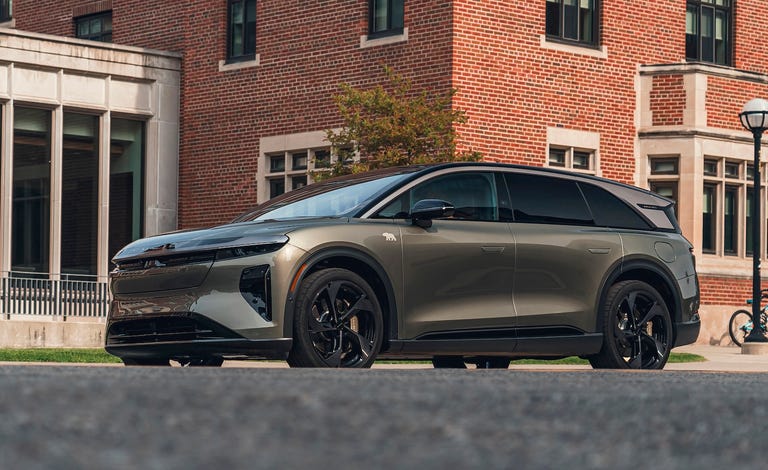
On the bright side, President Trump recently promised that tariffs on China would “come down substantially,” but that “it won’t be zero.”
The Future
Lucid Motors closed out 2024 on a high note. The company reported fourth-quarter revenue of $234.5 million, contributing to an impressive total annual revenue of $807.8 million. The company maintains a strong liquidity position with $6.13 billion available. This marks a notable leap forward, reflecting both increasing demand for Lucid’s ultra-luxury EVs and its expanding production capabilities.
Lucid’s financial strength, coupled with the increasing visibility of its flagship Lucid Air and the launch of its highly anticipated SUV, the Lucid Gravity, points to a future filled with opportunity. The brand is not only surviving in a competitive landscape—it’s showing real signs of thriving.
As production ramps up and new models come to market, 2025 could be the year Lucid shifts from challenger to serious contender in the premium EV space.

I’m Dr. Brandial Bright, also known as the AVangelist. As a dedicated and passionate researcher in autonomous and electric vehicles (AVs and EVs), my mission is to educate and raise awareness within the automotive industry. As the Founder and Managing Partner of Fifth Level Consulting, I promote the adoption and innovation of advanced vehicle technologies through speaking engagements, consulting, and research as we progress to level 5 fully autonomous vehicles.

